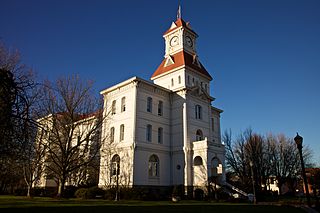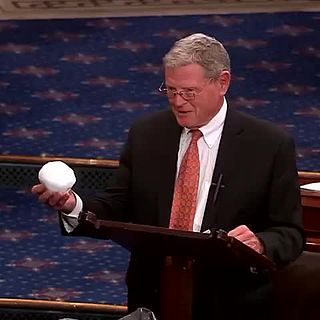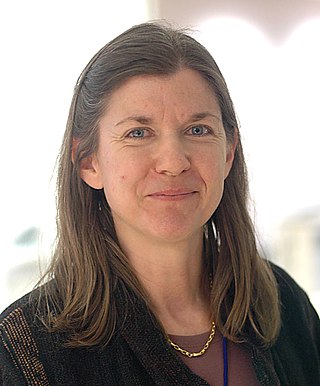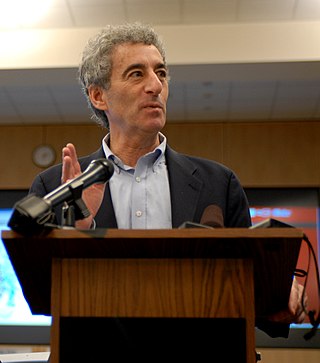Related Research Articles
Environmental skepticism is the belief that statements by environmentalists, and the environmental scientists who support them, are false or exaggerated. The term is also applied to those who are critical of environmentalism in general. It can additionally be defined as doubt about the authenticity or severity of environmental degradation. Environmental skepticism is closely linked with anti-environmentalism and climate change denial. Environmental skepticism can also be the result of cultural and lived experiences.

Siegfried Fred Singer was an Austrian-born American physicist and emeritus professor of environmental science at the University of Virginia, trained as an atmospheric physicist. He was known for rejecting the scientific consensus on several issues, including climate change, the connection between UV-B exposure and melanoma rates, stratospheric ozone loss being caused by chlorofluoro compounds, often used as refrigerants, and the health risks of passive smoking.

Corvallis is a city in and the county seat of Benton County in central western Oregon, United States. It is the principal city of the Corvallis, Oregon Metropolitan Statistical Area, which encompasses all of Benton County. As of the 2023 Census Population Estimates, the population was 61,087, making it the 9th most populous city in Oregon. This does include the 38,000 Oregon State University students attending classes in Corvallis, over 5,250 of which live in one of 16 residence halls on the main campus. Corvallis is the location of Oregon State University 420-acre main campus, Samaritan Health Services, a top 10 largest non-profit employer in the state, a 84-acre Good Samaritan Regional Medical Center campus, and a 2.2 million square foot, 197-acre Hewlett Packard research and development campus that invented the Laser jet printer and the Computer mouse. Corvallis is a part of the Silicon Forest Corvallis is the westernmost city in the contiguous 48 states with a population larger than 50,000.

Theodore Ralph Kulongoski is an American politician, judge, and lawyer who served as the 36th Governor of Oregon from 2003 to 2011. A member of the Democratic Party, he served in both houses of the Oregon Legislative Assembly and also served as the state Insurance Commissioner. He was the Attorney General of Oregon from 1993 to 1997 and a justice of the Oregon Supreme Court from 1997 to 2001. Kulongoski has served in all three branches of the Oregon state government.

There is a nearly unanimous scientific consensus that the Earth has been consistently warming since the start of the Industrial Revolution, that the rate of recent warming is largely unprecedented, and that this warming is mainly the result of a rapid increase in atmospheric carbon dioxide (CO2) caused by human activities. The human activities causing this warming include fossil fuel combustion, cement production, and land use changes such as deforestation, with a significant supporting role from the other greenhouse gases such as methane and nitrous oxide. This human role in climate change is considered "unequivocal" and "incontrovertible".
Robert C. Balling, Jr. is an American climatologist. He is a professor of geography at Arizona State University, and the former director of its Office of Climatology. His research interests include climatology, global climate change, and geographic information systems. Balling has declared himself one of the scientists who oppose the consensus on global warming, arguing in a 2009 book that anthropogenic global warming "is indeed real, but relatively modest", and maintaining that there is a publication bias in the scientific literature.

The Climatic Research Unit (CRU) is a component of the University of East Anglia and is one of the leading institutions concerned with the study of natural and anthropogenic climate change.
John Raymond Christy is a climate scientist at the University of Alabama in Huntsville (UAH) whose chief interests are satellite remote sensing of global climate and global climate change. He is best known, jointly with Roy Spencer, for the first successful development of a satellite temperature record.
Joe Bastardi is a professional meteorologist and weather forecaster. He is a frequent guest on TV news shows. Bastardi is an outspoken denier of human-induced global warming whose public statements frequently contradict the scientific consensus on climate change.
David Russell Legates is a former professor of geography at the University of Delaware. He is the former Director of the Center for Climatic Research at the same university and a former Delaware state climatologist. In September 2020, the Trump administration appointed him as deputy assistant secretary of commerce for observation and prediction at the National Oceanic and Atmospheric Administration.
James Max Spann Jr. is a television meteorologist, TikTok, and podcast host based in Birmingham, Alabama. He currently works for WBMA-LD, Birmingham's ABC affiliate. Spann has worked in the field since 1978. He also hosts the podcast WeatherBrains which he started in 2006.

The Great Global Warming Swindle is a 2007 British polemical documentary film directed by Martin Durkin. The film denies the scientific consensus about the reality and causes of climate change, justifying this by suggesting that climatology is influenced by funding and political factors. The program was formally criticised by Ofcom, the UK broadcasting regulatory agency, which ruled the film failed to uphold due impartiality and upheld complaints of misrepresentation made by David King, who appeared in the film.

Climate change denial is a form of science denial characterized by rejecting, refusing to acknowledge, disputing, or fighting the scientific consensus on climate change. Those promoting denial commonly use rhetorical tactics to give the appearance of a scientific controversy where there is none. Climate change denial includes unreasonable doubts about the extent to which climate change is caused by humans, its effects on nature and human society, and the potential of adaptation to global warming by human actions. To a lesser extent, climate change denial can also be implicit when people accept the science but fail to reconcile it with their belief or action. Several studies have analyzed these positions as forms of denialism, pseudoscience, or propaganda.

Willard Anthony Watts is an American blogger who runs Watts Up With That?, a climate change denial blog that opposes the scientific consensus on climate change. A former television meteorologist and current radio meteorologist, he is also founder of the Surface Stations project, a volunteer initiative to document the condition of U.S. weather stations. The Heartland Institute helped fund some of Watts' projects, including publishing a report on the Surface Stations project, and invited him to be a paid speaker at its International Conference on Climate Change from 2008 to 2014.
Watts Up With That? (WUWT) is a blog promoting climate change denial that was created by Anthony Watts in 2006.

Judith A. Curry is an American climatologist and former chair of the School of Earth and Atmospheric Sciences at the Georgia Institute of Technology. Her research interests include hurricanes, remote sensing, atmospheric modeling, polar climates, air-sea interactions, climate models, and the use of unmanned aerial vehicles for atmospheric research. She was a member of the National Research Council's Climate Research Committee, published over a hundred scientific papers, and co-edited several major works. Curry retired from academia in 2017 at age 63, coinciding with her public climate change skepticism.

Berkeley Earth is a Berkeley, California-based independent 501(c)(3) non-profit focused on land temperature data analysis for climate science. Berkeley Earth was founded in early 2010 to address the major concerns from outside the scientific community regarding global warming and the instrumental temperature record. The project's stated aim was a "transparent approach, based on data analysis." In February 2013, Berkeley Earth became an independent non-profit. In August 2013, Berkeley Earth was granted 501(c)(3) tax-exempt status by the US government. The primary product is air temperatures over land, but they also produce a global dataset resulting from a merge of their land data with HadSST.
Timothy Francis Ball was a British-born Canadian public speaker and writer who was a professor in the Department of Geography at the University of Winnipeg from 1971 until his retirement in 1996. Subsequently Ball became active in promoting rejection of the scientific consensus on global warming, giving public talks and writing opinion pieces and letters to the editor for Canadian newspapers.
Anthony R. Lupo is a department chair and professor of atmospheric science at the University of Missouri. He became a member of the American Meteorological Society in 1987, Sigma Xi in 1992, the National Weather Association in 2000, is a former expert reviewer for the 2001 IPCC Third Assessment Report, and became a Fulbright Scholar in 2004. He is also a fellow of the Royal Meteorological Society and the editor-in-chief of the scientific journal National Weather Digest.

Clifford F. Mass is an American professor of Atmospheric Sciences at the University of Washington. His research focuses on numerical weather modeling and prediction, the role of topography in the evolution of weather systems, regional climate modeling, and the weather of the Pacific Northwest. He is a fellow of the American Meteorological Society, past-president of the Puget Sound American Meteorological Society chapter, and past chair of the College of the Environment College Council.
References
- 1 2 3 "George H. Taylor, M.S., Certified Consulting Meteorologist: Resume of Experience" (PDF). Retrieved 20 March 2014.
- ↑ Odegard, Kyle (21 February 2008). "George Taylor to Retire After 19 Years at Oregon Climate Service". Corvallis Gazette-Times . Retrieved 20 March 2014.
- ↑ Floyd, Mark (16 March 2007). "When it Comes to Baseball, It's All About the Weather". Oregon State University. Retrieved 20 March 2014.
- ↑ Hochberg, Lee (21 June 2007). "Oregon Global Warming Skeptic Finds Controversy". PBS NewsHour . Retrieved 20 March 2014.
- ↑ "Not Ted's weatherman". The Oregonian . 5 June 2006.
- ↑ "About ACS". Applied Climate Services. Archived from the original on 13 February 2014. Retrieved 20 March 2014.
- ↑ Fuqua, Canda (7 February 2014). "Temperature a Record Low, but Snowfall Not a Record High". Corvallis Gazette-Times. Retrieved 20 March 2014.
- 1 2 Tomlinson, Stuart (21 February 2008). "Update: Controversial "State Climatologist" Steps Aside". OregonLive.com . Retrieved 20 March 2014.
Taylor said he believes climate change is a combination of natural factor and human factors. "I don't deny that human activities affect climate change," he said. "But I believe up to now, natural variations have played a more important role than human activities.
- ↑ Eilperin, Juliet (17 September 2006). "Climatologist Draws Heat From Critics". Washington Post . Retrieved 20 March 2014.
- 1 2 Koberstein, Paul (24 August 2005). "Hot or Not". Willamette Week . Portland, Oregon. Retrieved 20 March 2014.
- ↑ Knickerbocker, Brad (20 September 2007). "Global-warming Skeptics: Might Warming be 'normal'?". Christian Science Monitor . Retrieved 22 March 2014.